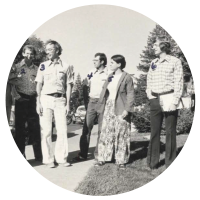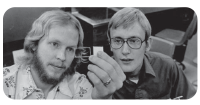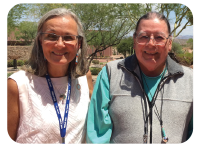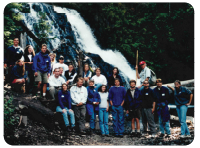Before WWAMI
1950
- First class of UW School of Medicine students graduate; 50 students receive MD degrees.
1950
1968
- The MEDEX Northwest physician assistant program is founded.
1968
1969
- The first MEDEX class starts training.

1969
1970
1970
 A $1 million grant from the Commonwealth Fund of New York City is secured to fund the regional medical education program.
A $1 million grant from the Commonwealth Fund of New York City is secured to fund the regional medical education program.- Family Medicine is established as a division of UW School of Medicine.
1970
1971
- UW School of Medicine partners with Washington, Alaska, Montana and Idaho to form WAMI (Wyoming joined in 1996).
- University of Alaska Fairbanks - the first home-state university site for the WAMI Program - welcomes nine students.
- A surgery residency rotation is established at the Wenatchee Valley Clinic/Central Washington Hospital.
- Family Medicine is established as a full department and clerkships begin in Omak and Grandview, WA.
1971
1972
- Washington State University-Pullman, Montana State University and University of Idaho join WAMI.
- The UW Family Medicine Residency Network is established.

1972
1975
- MEDCON, a toll-free communications network, launches, allowing community physicians to consult with faculty at the School via phone.
- The Family Medicine Residency of Idaho is established in Boise, ID.
- The University of Wyoming Family Medicine Residency Program is established in Casper, WY.
1975
1976
- The Family Practice Residency is established in Yakima, WA.

1976
1977
- The Internal Medicine Primary Care Track is established in Boise, ID, by the UW Department of Medicine.
1977
1978
- WAMI is fully self-sustaining; each participating state provides support.
1978
1980
1980
- The University of Wyoming Family Medicine Residency is established in Cheyenne, WY.
1980
1985
- WAMI Area Health Education Centers (AHEC) is established with federal grant funding for UW School of Medicine to train, recruit and retain health personnel for medically underserved areas.
1985
1986
 Graduate Medical Education grows in the WAMI region to support the training of 149 residents in family medicine.
Graduate Medical Education grows in the WAMI region to support the training of 149 residents in family medicine.- The Internal Medicine Residency offers rotations in Montana and Washington; pediatrics, obstetrics and gynecology, and psychiatry add community-based residency rotations.
- The first U.S. Family Medicine Rural Training Track residency is established in Colville, WA.
1986
1989
- The Minority Medical Education Program is established to offer guidance for underrepresented minority students interested in careers in medicine.
1989
1989
- The Rural Underserved Opportunities Program (RUOP) launches and sends its first medical students to small towns to acquaint them with practice in physician shortage areas.
- Alaska WAMI moves from University of Alaska Fairbanks to University of Alaska Anchorage.
- Medical Education and Biomedical Informatics, founded in 1967, achieves departmental status.
1989
1990
1991
- The Spokane Advanced Clinician Track of the UW Psychiatry Residency Program is established.
1991
1992
- Dr. Walt Hollow (Assiniboine-Sioux), the first Native American to graduate from the UW School of Medicine, creates the School's Indian Health Pathway. This was the first established pathway at the School.

1992
1993
- For the first time, more than 50% of graduates from the School match into primary care residencies.
1993
1994
- The MEDEX Yakima site opens with 12 students.
1994
1996
- The Montana Family Medicine Residency is established in Billings, MT.
- Wyoming becomes the fifth state to join WWAMI, adding the second ''W." The contract is signed in 1996 and 10 medical students make up the inaugural class in the 1997-98 academic year.
1996
1997
- The WWAMI Rural Telemedicine Network is funded by the Federal Office of Rural Health Policy to explore the use of telemedicine in rural communities.
- The MEDEX Northwest physician assistant program opens a Spokane site with 12 students.
1997
1998
- The first WWAMI Rural Integrated Training Experience (WRITE) communities are established in Libby, MT; Othello, WA; and Hailey and Sandpoint, ID.

1998
1998
- The Alaska Family Medicine Residency is established in Anchorage.
1998
2000
2001
- The WWAMI Colleges program is established to oversee a four-year integrated curriculum of clinical skills and professionalism.
- MEDEX adds faculty to University of Alaska Anchorage to work with clinical placements and the MEDEX-UAA bachelor's degree link.
- A curriculum renewal in the MD program is implemented beginning in the 2001-02 academic year.
2001
2002
- WWAMI receives the Outstanding Community Service Award from the American Academy of Medical Colleges (AAMC).
2002
2004
- The School and the Dept. of Global Health establish the Global Health Pathway.
2004
2005
- The Institute for Surgical and lnterventional Simulation (ISIS) is initiated to enhance procedural skills training, medical teamwork and patient safety. (In 2008, the name changed to Institute for Simulation and lnterprofessional Studies, still lSIS.) In 2016, ISIS changed its name to theWWAMI Institute for Simulation in Healthcare (WISH).

2005
2006
- The Idaho Track of the UW Psychiatry Residency Program is established in Boise, ID.
2006
2006
- The School's Dept. of Family Medicine establishes the Underserved Pathway.
- A feasibility study recommends initiation of a WWAMI first-year class in Spokane beginning in 2008 to meet the need for more primary care physicians in eastern Washington.
2006
2008
 The Targeted Rural Underserved Track (TRUST) is established; Montana is the first state with three TRUST sites.
The Targeted Rural Underserved Track (TRUST) is established; Montana is the first state with three TRUST sites.- Spokane WWAMI is established on the Washington State University Riverpoint Campus.
- The Hispanic (now Latinx) Health Pathway is established by Dr. David Acosta, currently the Chief Diversity Officer for the AAMC.
2008
2009
- The rural training track starts in Twin Falls/Jerome, ID.
- The TRUST program expands into Washington with two sites.
- MEDEX opens Anchorage, AK site with the University of Alaska Anchorage.
2009
2010
2010
- The first WWAMI Graduate Medical Education Summit is held in Spokane.
2010
2011
- More than 200 graduates have completed the WRITE program.
- MEDEX joins the Dept. of Family Medicine.
2011
2013
- The WWAMI Program at Washington State University Pullman closes and all remaining students move to Spokane.
- MEDEX Northwest opens the Tacoma, WA campus.
- MEDEX Yakima closes.
2013
2014
- Olympia Longitudinal Integrated Clerkship (LIC) launches as pilot program with two students.
- University of Washington and Washington State University dissolve WWAMI partnership.
2014
2015
- UW School of Medicine launches the first major change to the curriculum since 2001. The new integrated curriculum features active learning, shorter class hours, earlier introduction to clinical training and increased emphasis on lifelong learning skills.

2015
2015
- The TRUST program expands into Alaska with one site.
2015
2016
- The Office of Rural Programs is established, bringing the RUOP, TRUST, WRITE and WWAMI AHEC programs under one centralized office.
- UW School of Medicine Spokane partners with Gonzaga University for Foundations training.
- The UW School of Medicine Center for Health Equity, Diversity and Inclusion establishes the LGBTQIA+ Health Pathway.
2016
2017
 RUOP expands to over 140 clinical training sites across WWAMI.
RUOP expands to over 140 clinical training sites across WWAMI.
2017
2018
- The WRITE program expands to 40 clinical training sites across WWAMI.
- The School establishes a summer Prematriculation (PreMat) Program for students underrepresented in medicine (URiM) and those who have been away from intensive academic programs to help them transition to medical school.
2018
2019
- The RUOP program celebrates 30 years and 2,400 student rotations hosted since 1989.
2019
2020
2020
 The Olympia LIC earns permanent status.
The Olympia LIC earns permanent status.- More than 300 graduates have completed the WRITE program.
- MEDEX Northwest opens the Kona, HI campus.
- The Division for Healthcare Simulation Science is developed under the Department of Surgery. It includes WISH, the Center for Research in Simulation Education Technologies (CREST) and, soon, a master's program in Healthcare Simulation Science.
2020
2021
- The Office of Healthcare Equity is established.
2021
2022
- The UW School of Medicine Black Health Justice Pathway is established.

2022




 A $1 million grant from the Commonwealth Fund of New York City is secured to fund the regional medical education program.
A $1 million grant from the Commonwealth Fund of New York City is secured to fund the regional medical education program.

 Graduate Medical Education grows in the WAMI region to support the training of 149 residents in family medicine.
Graduate Medical Education grows in the WAMI region to support the training of 149 residents in family medicine.


 The Targeted Rural Underserved Track (TRUST) is established; Montana is the first state with three TRUST sites.
The Targeted Rural Underserved Track (TRUST) is established; Montana is the first state with three TRUST sites.
 RUOP expands to over 140 clinical training sites across WWAMI.
RUOP expands to over 140 clinical training sites across WWAMI. The Olympia LIC earns permanent status.
The Olympia LIC earns permanent status.